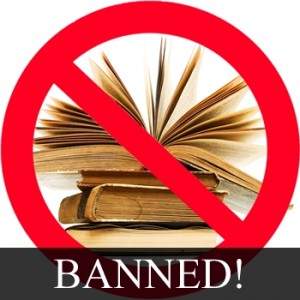In a recent post from the ALA Office for Intellectual Freedom, Pat Peters examined the relationship between common sense and censorship — or, rather, the lack of a relationship between the two.
Peters provided a few examples of challenges that didn’t, well, make much sense:
- a parent who blamed Carl Deuker’s On the Devil’s Court for her daughter’s mental illness
- multiple parental complaints that Madeleine L’Engle’s A Wrinkle in Time promoted occult practices
Most challenges are well-meaning if misguided, but Peters’ column brought to mind some of the more befuddling challenges to comics that CBLDF has faced over the years.
In 2006, a library patron in Marshall, Missouri, challenged Alison Bechdel’s Fun Home and Craig Thompson’s Blankets over alleged obscene illustrations. Both books do depict nudity, but it’s a far cry from obscene. The complainant was concerned that the artwork would attract children and that the library itself would attract a clientele on par with porn shops. At the time, the library didn’t have a challenge policy. They opted to draft one, but kept Blankets and Fun Home off shelves while they did so. Thanks to a highly publicized letter from CBLDF and the National Coalition Against Censorship, the books were ultimately restored.
Jeff Smith’s Bone — a perennial all-ages favorite — has a handful of confusing challenges. In 2010, a Minnesota parent whose son had just completed the D.A.R.E. program demanded the removal of the series because she thought it advocated for drinking and smoking. Some characters in the series do drink (one, after all, runs a tavern) and smoke, but those characters are clearly adults and the depiction in no way glorifies the act. In 2013, Bone was accused of being “politically, racially, or socially offensive” in a Texas school.
Drama by Raina Telgemeier, a bestselling middle grades graphic novel, has been labelled sexually explicit by some challengers despite the book having zero sex and no profanity. The complaints usually pertain to the inclusion of LGBTQ characters and a chaste kiss between two male characters.
Art Spiegelman’s Pulitzer Prize-winning graphic novel Maus was pulled from retail store shelves in Russia due to the depiction of a swastika on the cover. Russian law prohibits the display of Nazi propaganda, but several major booksellers in the country couldn’t differentiate between Nazi propaganda and a graphic novel that was clearly the antithesis of such.
Jillian and Mariko Tamaki’s award-winning graphic novel This One Summer topped ALA’s list of the most frequently challenged books in 2016. Among the challenges to the book was one pertaining to LGBTQ content. The only specific mention of such content occurs once in the book, when one of the main characters makes a joke about going to a summer camp where “all the kids’ parents except mine were lesbians.”
Peters recommends that library staff prepare themselves for challenges — common sense or not — with the following:
- have policies and procedures in place related to collection development and how to deal with challenges,
- train all staff on how those policies operate, and
- follow those policies and procedures in all of our work.
CBLDF has a number of resources available for librarians and educators:
- How To Manage Challenges
- Graphic Novels: Suggestions for Librarians
- Adding Graphic Novels to Your Library or Classroom Collection
- Banned & Challenged Comics
- History of Comics Censorship
- Librarian & Educator Tools
If you need advice or have a First Amendment emergency, call us at 1-800-99-CBLDF or email info@cbldf.org!
Help support CBLDF’s important First Amendment work in 2017 by visiting the Rewards Zone, making a donation, or becoming a member of CBLDF!
